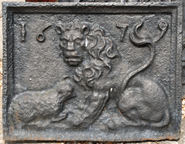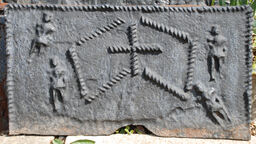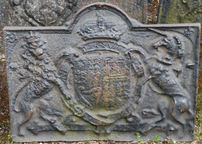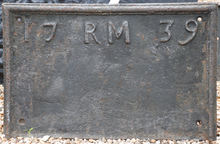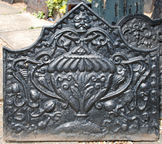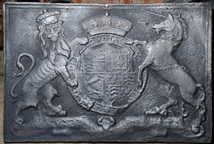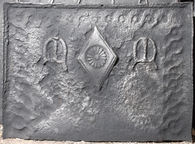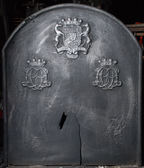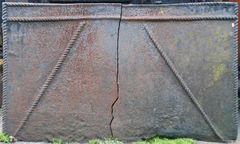-
624
Description: Rectangular; cavetto edging all round; seated lion on right, its tail rising above its back and its head turned to face the viewer; a seated sheep on the left; date split across top.
Notes: Intended to represent the saying, ‘The lion shall lie down with the lamb’, a popular misquotation of Isaiah 11: 6.
Copies of this fireback are known.
Inscription: 1679
- Decoration tags:
- rectangular (shape)
- cavetto (edging)
- whole carved pattern
- individual numbers
- pictorial
- biblical
- text
- animals
Manufactured: in 1679 in the Weald area of England.
Current location: Mark Ripley Forge & Fireplaces, Northbridge Street, Robertsbridge, East Sussex, England.
- Attached to series:
- Small cavetto series
- Old Testament & Apocrypha firebacks
-
628
Description: Rectangular; twisted rope edging (top and sides); twisted rope length stamped eight times in a mirrored double rhombus pattern with a central cross; a crude human figurine stamped irregularly four times, two on each side of the rope design.
Notes: An uncharacteristically small fireback for its likely period.
- Decoration tags:
- rectangular (shape)
- rope (edging)
- simple stamps
- carved stamps
- apotropaic
- objects
Manufactured: in the mid- to late-16th century possibly in the Weald area of England.
Current location: Mark Ripley Forge & Fireplaces, Northbridge Street, Robertsbridge, East Sussex, England.
- Attached to series:
- Miscellaneous stamp firebacks
- Figurine firebacks
- Rope design firebacks
-
633
Description: Arched rectangular shape with small rhomboidal flanges in the corners of the arch; cavetto moulded edge on all sides, with a rose stamp on each curved enlargement of the moulding in the top corners; Stuart royal arms (1605-88, 1702-14) with lion and unicorn supporters, garter, crown and motto.
Notes: A recasting. A casting of the same fireback is in the collection of the Sussex Archaeological Society, but with the addition of a person's name impressed from the broken handle of a skillet (no. 405).
Copies of this fireback are known.
Inscription: [Garter and royal mottoes]
Arms: English Stuart royal
- Decoration tags:
- rectangular with round arch (shape)
- cavetto (edging)
- whole carved pattern
- armorial
- royal
- text
Manufactured: in the late-17th century possibly in the Weald area of England.
Current location: Mark Ripley Forge & Fireplaces, Northbridge Street, Robertsbridge, East Sussex, England.
- Attached to series:
- Stuart royal armorial firebacks
-
634
Description: Rectangular; astragal and fillet moulding on top and side edges; symmetrical layout of date and initials; date split between left and right sides, initials in middle.
Notes: One of a series of backs dating to the 1730s and 40s using very similar sets of letters and numerals. Sold at Christie's Masters and Makers auction, 30 November 2010, lot 521 (£1000 part lot with no. 601, no. 623 and no. 637).
Inscription: 17 RM 39
- Decoration tags:
- rectangular (shape)
- astragal & fillet (edging)
- individual letters
- individual numbers
- text
Manufactured: in 1739 in the Weald area of England.
Current location: not known.
- Attached to series:
- 1730s-40s, date & initial series
-
637
Description: Rectangular; astragal and fillet edging; date across top of plate.
Notes: One of a series of backs dating to the 1730s and 40s using very similar sets of letters and numerals. Sold at Christie's Masters and Makers auction, 30 November 2010, lot 521 (£1000 part lot with no. 601, no. 623 and no. 634).
Inscription: 1736
- Decoration tags:
- rectangular (shape)
- astragal & fillet (edging)
- individual numbers
- text
Manufactured: in 1736 in the Weald area of England.
Current location: not known.
- Attached to series:
- Date only firebacks
- 1730s-40s, date & initial series
-
638
Description: Rectangular with cavetto curves rising to corners and a ‘pediment’ top; fillet edging with low-relief, alternate regularly-spaced semi-circles and triangles inside; two-handled flower vase with gadrooned upper surface and symmetrical flower design in relief below; trailing vines and flowers issuing from top and descending through handles to base; human face at top; second half of date to right of vase base.
Notes: Another version, probably by a different pattern-maker, is dated 1662; a recasting; an earlier casting measures 665mm x 610mm
Copies of this fireback are known.
Inscription: [...] 52
- Decoration tags:
- rectangular with canted top corners and triangular arch (shape)
- scalloped fillet (edging)
- whole carved pattern
- pictorial
- text
- plants
- objects
Manufactured: in 1652 possibly at Brede Furnace in the Weald area of England.
Current location: Mark Ripley Forge & Fireplaces, Northbridge Street, Robertsbridge, East Sussex, England.
- Attached to series:
- Gadrooned vase firebacks
- Hooked '1' series
- Brede group
-
304
Description: Rectangular; cavetto-moulded edging; English royal Stuart shield, garter, crown, supporters and motto.
Notes: One of many designs of the Stuart royal arms on firebacks. A recasting, hence the illegible motto. Sold at Christie's Masters and Makers auction, 30 November 2010, lot 517 (£1,875).
Copies of this fireback are known.
Inscription: HONI SOIT QVI MAL Y PENSE / DIEV ET MON DROIT
Arms: English Stuart royal
- Decoration tags:
- rectangular (shape)
- cavetto (edging)
- whole carved pattern
- armorial
- royal
- text
Manufactured: in the 17th century in England.
Current location: Suffolk House Antiques, High Street, Yoxford, Suffolk, England.
- Attached to series:
- Stuart royal armorial firebacks
-
640
Description: Rectangular; ovolo-moulded edging (top and sides); repeated guilloche pattern inside top and side edges; upper centre, lozenge stamp with ovolo edges and recessed daisy flower in centre, between buckle stamps repeated twice.
Notes: The lozenge stamp is a design also seen on domestic interior panelling; the buckles suggest a Pelham family association; the buckle and lozenge are separate stamps, and in each example their relative positions differ slightly; the guilloche design appears to have been carved on the base panel; an example at The Star Inn, Alfriston, Sussex measures 665mm x 480mm.
- Decoration tags:
- rectangular (shape)
- ovolo (edging)
- carved stamps
- carved pattern panels
- heraldic
- objects
Manufactured: in the early- to mid-17th century in the Weald area of England.
Current location: Mark Ripley Forge & Fireplaces, Northbridge Street, Robertsbridge, East Sussex, England.
- Attached to series:
- Pelham family firebacks
- Pelham buckle and lozenge series
- Metalware stamp firebacks
-
641
Description: Rectangular with arched top; astragal moulded edging (top and sides); top centre, shield, supporters, coronet and motto of the 1st Baron Ashburnham: (1st & 4th) gu. a fess between six mullets ar. (Ashburnham), (2nd) az. semee of fleurs-de-lys a lion rampant guardant ar. (Holland), (3rd) erm. three crescents gu. (Kenn); on an escutcheon of pretence, sa. a chevron between three boys' heads couped at the shoulders proper each entwined around the neck with a snake vert (Vaughan). Supporters: two greyhounds sa. their faces, breasts, and feet ar. collared and lined or; below left and right, a monogram of B and J with a baron’s coronet above.
Notes: John Ashburnham, who married Bridget Vaughan in 1677, was created baron in 1689. he died in 1710. The fireback dates from between 1689 and 1710.
Inscription: LE ROY ET L’ESTAT
Arms: John, 1st Baron Ashburnham
- Decoration tags:
- rounded arched (shape)
- astragal (edging)
- carved stamps
- armorial
- text
Manufactured: in the late-17th to early-18th century probably at Ashburnham Furnace in the Weald area of England.
Current location: Mark Ripley Forge & Fireplaces, Northbridge Street, Robertsbridge, East Sussex, England.
- Attached to series:
- Ashburnham family firebacks
- Personal armorial firebacks
-
642
Description: Rectangular; twisted rope edging (top and sides); length of twisted rope parallel with, and equal to, top edge; length of rope, equal to side edge, repeated twice slanting from near top middle to bottom corners.
Notes: Very simple design using only two lengths of rope.
- Decoration tags:
- rectangular (shape)
- rope (edging)
- simple stamps
- objects
Manufactured: in the 16th century in the Weald area of England.
Current location: Mark Ripley Forge & Fireplaces, Northbridge Street, Robertsbridge, East Sussex, England.
- Attached to series:
- Rope design firebacks
